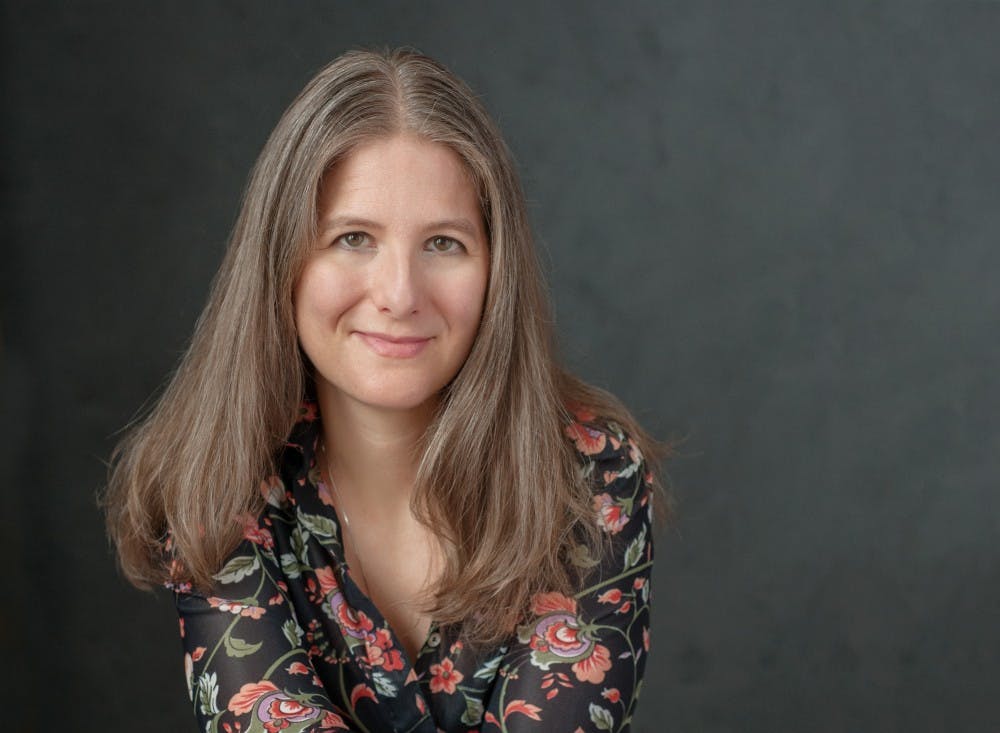Religion faculty member promotes inclusion, engages in activism
Religion faculty member Laurel Zwissler’s office walls are covered with students’ doodles illustrating class concepts: a man with binoculars staring at a stoplight demonstrates Foucault’s power theories, while a sink that looks like a prop from a science-fiction movie stands as commentary on modern culture.
Zwissler tries to incorporate drawing into every course to help students think creatively.
Some of this sense of imagination may be necessary for a religions class at Central Michigan University. Zwissler teaches her classes with a focus on inclusion and diversity, but she said it's often difficult for students to apply those concepts in a university lacking in diversity, like CMU. The university's student population is 72.3 percent white, which means CMU's environment is saturated with predominantly white perspectives.
Whether it’s advocating for a gender and sexuality center on campus or bringing together various groups to combat the roots causes of sexual assault, Zwissler brings her passion for inclusivity and social justice wherever she goes.
Zwissler tries to encourage religious tolerance by teaching students to “cultivate a worldview of multiple worldviews.”
She noted this doesn’t mean abandoning one’s beliefs — but means learning to see the world through others' perspectives.
Zwissler’s journey to becoming a religion scholar started when she took a western religions class during her undergraduate years at the University of Michigan.
She said she was raised to see people with beliefs that differed from hers as “crazy and bad,” but that narrative didn’t fit her experience when she actually began interacting with people.
“That’s part of the irony, right? Everyone’s busy looking suspiciously at one another," Zwissler said. “If you can take a breath and take step back from that, what you realize is that everybody is operating in worldviews that make sense to them.”
She said understanding world religions can contribute to understanding in other areas, including political and cultural spheres.
Religious tolerance in Islam is an example of this, Zwissler said. Beliefs about Islam can be colored by violent, intolerant groups like ISIS — creating even more misunderstanding of the religion.
Historically, Muslims have believed in tolerance for the other Abrahamic religions -- Judaism and Christianity -- seeing their followers as fellow “People of the Book.” As Islam spread, that idea carried over to other religions like Zoroastrianism and Hinduism.
“(The idea was) it’d be great if you were Muslim because Islam’s the best, but other religions are OK too,” Zwissler said. “And (other religions) deserve protection and respect.”
Respect is a pervasive theme in Zwissler’s classes, former students say.
“(She’s) very keen about making sure everyone’s comfortable with inclusion,” Spring 2018 religion studies graduate Jacob Vandenboom said.
He said this inclusion shines through in Zwissler’s attention to issues, from preferred pronouns to asking students to come to her if the way any issues are discussed makes them feel excluded.
Zwissler’s care expands beyond the classroom, said Cali Winslow, Spring 2018 sociology and women and gender studies graduate.
When Zwissler was hired at the university in 2012 with degrees in both religion and women and gender studies, she felt a responsibility to become involved.
“To me, feminism and action are deeply entwined,” Zwissler said.
Winslow took two classes with Zwissler and was co-president of Students Advocating for Gender Equality, a Registered Student Organization Zwissler advises. Winslow now works under Zwissler, transcribing interviews for religion field research.
While Zwissler now helps student feminists, her own college activism was mostly focused on economic trade agreements as well as labor rights and exploitation.
The professor uses her own past of college activism to teach students more effective advocacy practices as an adviser, Winslow said.
“(My activist community believed) governments should be responsive to people on the ground,” Zwissler said. “And if they’re not, then people on the ground have a right and obligation to make a huge ruckus.”
Winslow said she learned about activism from Zwissler in Students Advocating Gender Equality, during an activism workshop and in personal conversations.
“She (thinks), ‘I’m here to help people; it doesn’t matter if it’s my class or not,’’” Winslow said. “I appreciate that a lot.”
Zwissler still has a passion for labor rights. Winslow often comes to Zwissler with questions about how to live a life of ethical consumption.
“Seeing the way that she lives very intentionally and lets her values shine through in everything she does has been really inspiring,” Winslow said. “I’ve tried to emulate that in my own life.”







